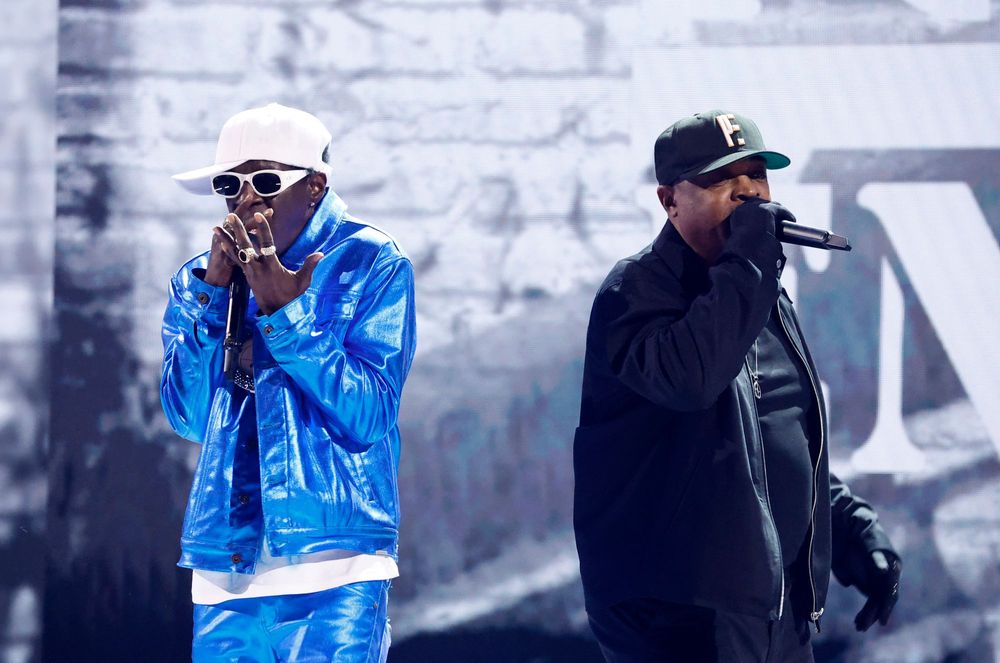Even if Kendrick Lamar, Beyoncé, and Bad Bunny ultimately got robbed at the 65th annual Grammy Awards, the big story of last night was the brilliant “50 Years of Hip-Hop” medley towards the end of the ceremony. The segment saw dozens of icons performing their biggest hits and reviving seminal eras that shaped this thing we call hip-hop. From Bronx DJs spinning disco records and urging Black and brown youth to cut a rug in sweaty basements to GloRilla hanging out the window with her ratchet-ass friends on Beale Street, this portion of the show was the telecast’s highlight. If you love hip-hop, it probably put a tear in your eye.
In an interview with the New York Times, Questlove, who was put in charge of squeezing 50 years into under 15 minutes, said “it was a lot of mountains to move to make this happen.” Which is a given. Getting Rakim, De La Soul, Big Boi, Missy Elliott, Queen Latifah, Scarface, Grandmaster Flash, Method Man, Lil Uzi Vert, Busta Rhymes and Spliff Star, Salt-N-Pepa, and Nelly (among countless others) on the same stage is a gargantuan feat. I’m not sure there’s a warm body on Earth more capable of this task than Questlove. Yet while the “50 Years of Hip-Hop” segment was amazing, there were a few aspects that missed the mark.
Because this was such a shocking and iconic moment, a couple of glaring omissions and odd choices stick out. For one, seeing DJ Jazzy Jeff on stage without his right-hand man the Fresh Prince takes you out of the experience. Questlove said Will Smith had scheduling conflicts with Bad Boys 4, but every party involved should’ve made sure he was there. No matter how many people think he’s a corny rapper, Big Willie is one of the most important MCs ever. If you disagree, watch what you have to say about this to his face—he might slap the shit out of you.
Other peculiar absences included the elusive half of OutKast, Snoop Doggy Dogg, Puff Daddy, Ludacris, 50 Cent, and who should’ve been the segment’s token white boy, Eminem. André 3000 was probably playing the flute somewhere, but if we’re using this as a historical romp through time, those omissions are unfortunate. You can’t tell the story of hip-hop without Bad Boy Records, “Many Men,” or the exuberance of Luda during his big ‘fro and braids era. A bit of “Welcome to Atlanta” and “Drop It Like It’s Hot” would’ve represented Luda and Snoop, plus producer-artists Jermaine Dupri and Pharrell (who instead was shown rapping along to other artists’ music multiple times from the audience).
The biggest misstep, however, may have been the awkward jump from 2001’s “We Gonna Make It” to Lil Baby’s “Freestyle” from 2017. The Jadakiss and Styles P track is a thundering, high-energy anthem while “Freestyle” is closer to a rap ballad. A tonal shift this drastic is like coming inside after spending hours in the cold and running hot tap water on your hands—sharp, blistering, painful. We also time warped through 16 years of hip-hop, a portion during which the genre changed more than ever. There was a huge gap in the storytelling element, omitting subgenres like crunk (Lil Jon), early trap (Gucci Mane, T.I., Jeezy), Auto-Tune (T-Pain), blog era (Kendrick, Cole, Drake, Sean, Wale, Wiz, Future), amongst others. If the Grammys didn’t give Questlove enough time, then dammit, he needed more. The final act, while very fun during GloRilla and Lil Uzi Vert’s moments, felt slapdash and fleeting to the overall narrative.
Hip-hop has been historically disrespected by the National Academy of Recording Arts and Sciences. It’s basically a Grammy tradition. When the Best Rap Performance was introduced to the ceremony in 1989 as an untelevised award, the nominees organized a boycott. In the years since, there have been a myriad of decisions involving the Grammys that range from weird to pretty racist. The “50 Years of Hip-Hop” medley forgives a lot, though certainly not all. (DJ Khaled, Lil Wayne, Rick Ross, and Jay-Z closing out the show in spectacular fashion helps, too—and explains their absences from the medley.) We still on their heads until they consistently give Black artists their just due in the major categories, but “50 Years of Hip-Hop” is an imperfect yet unquestionably dope means of putting some respeck on a massively influential culture.
More From LEVEL:
